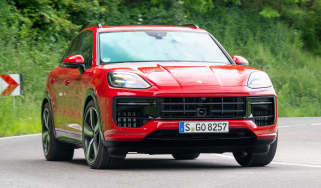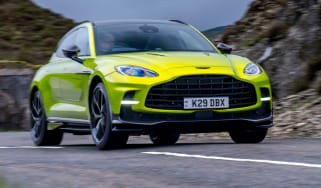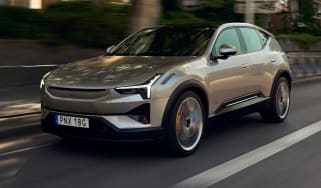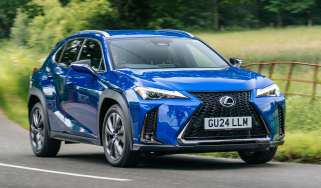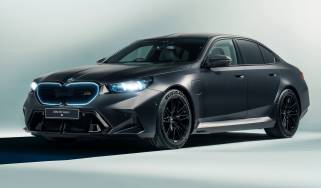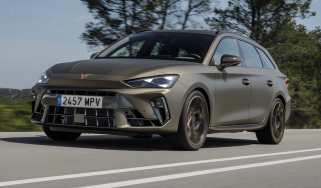Porsche Cayenne Turbo (Mk1, 2003 - 2007): review, history and buying guide
The launch of the Porsche Cayenne changed the performance car landscape forever, making the first iteration one of our top 25 cars of the last 25 years
We were just getting used to the idea of the 911 engine being water-cooled rather than air-cooled when Porsche sprung another surprise on us: the company was entering the SUV market with a big 4x4. In fact it did a brilliant job of keeping the Cayenne under wraps during the development process (the board decision to build it had been taken back in 1998), only announcing it was going into production a few months before the first press drives took place in November 2002.
Porsche aficionados didn’t know what to make of the Cayenne at launch. It wasn’t exactly pretty, with a cumbersome look, especially so the 450bhp Turbo version with its gaping grilles. With a claimed 0-62mph time of 5.6sec and a top speed of 165mph, the on-paper performance appeared very Porsche-like, though a Ring lap-time of 8 minutes perhaps told another story.
> The new Porsche Macan kick starts the firm’s next generation of EVs
I remember asking Porsche’s head of design at the time, Harm Lagaay, why there wasn’t any form of front air-dam on the Cayenne to help control lift at big speeds and he quickly replied: ‘The Cayenne has a kerb weight in excess of 2 tonnes, so who cares a shit about a few kilos of front lift!’ Well, quite.
But whatever enthusiasts and commentators thought about the Cayenne, customers loved it and sales proved to be even better than Porsche had dared hope. With the Cayenne S priced at £44,530 at launch (the Turbo was £68,970), it was a cheaper way into Porsche ownership and had the added bonus that you could take your family along for the ride, too.
Other manufacturers soon noticed Porsche’s success with the Cayenne and responded with their own performance SUVs. Think Range Rover Sport, Audi Q5 and, a few years later, the Lamborghini Urus, which would have been unthinkable before the arrival of the Porsche SUV.
The continued success of the Cayenne meant Porsche was seriously in the money. Boxster and 911 sales were already good in the early noughties but, historically, sales of sports cars were sensitive to any economic shocks. That wasn’t such an issue with SUV sales, as they were deemed to be family cars and a more essential purchase; consequently the Cayenne helped Porsche ride out the 2008-2010 financial crisis, when sports car sales slowed dramatically. It also helped that the Cayenne was heavily based on the VW Touareg, which meant development costs weren’t nearly as high as they could have been had they gone it alone. With the money pouring in, Porsche had the spending power to develop more specialist versions of the 911, including the highly successful GT3 and GT3 RS models, which kept the enthusiasts happy too.
It’s not often that a car is launched and proves so successful that it changes the whole perception of the brand, but that’s what the Cayenne did for Porsche, despite the many doubters at the beginning. However, the Cayenne’s biggest achievement is that it also changed the performance car market forever – and that makes it something truly exceptional.
Buying checkpoints
One early-Cayenne must-have is air suspension, which is standard on the Turbo. The S and V6 models with steel springs have a harsh, unyielding ride, a deficiency remedied by the 2007 revamp. The air suspension also adjusts its height as required, lowering itself at speed and raising itself when it senses troubled terrain. But even an air-sprung Cayenne in Comfort mode is still a taut, responsive machine able to perform agility feats previously undreamed of in an SUV, helped by a nominally rearward torque split. In essence the Cayenne feels a little like a 928 GTS, only taller and more sophisticated.
These early Cayennes are not paragons of reliability, though, and age doesn’t help. Here, too, they are like a modern 928, especially in their electrical gremlins. Porsche specialist JZ Machtech goes so far as to recommend buyers avoid a pre-2007 Cayenne S entirely, thanks to a tendency beyond around 70,000 miles towards disintegrating Lokasil cylinder coatings and consequent catastrophic engine failure. A new engine from Porsche, once fitted, will - at around £18,000 - cost more than the car is worth.
In fact, JZ Machtech has given up selling all early Cayennes because they cause too much grief when customers bring them back for the inevitable faults to be fixed. Typically you’ll find early Cayennes at 4x4 specialists rather than Porsche specialists, where the vibe is as different as the customers. So avoid the S and either opt for a sensible V6 (quite slow and little more economical than the S) or go for broke, brace yourself for a regular 14mpg and find a Turbo from £15,000. It’s bonkers, but there’s nothing else quite like it.
Engine
Turbos and V6s are broadly trouble-free apart from the V8’s original plastic coolant pipes under the inlet manifold, which should have been changed to the later aluminium ones. Each spark plug’s individual coil pack can fail, too, leading to a misfire. The big problem is the S’s Lokasil cylinder-coating failure. It starts with a sudden appetite for oil and an increasing knock, followed by a misfire as the bores and pistons are shredded. From first signs to death can take as little as 500 miles, and the problem can strike from around 70,000 miles. Turbos and later S models have a Nikasil coating which gives no trouble.
Transmission
Generally reliable, including the four-wheel-drive componentry, but the automatic gearbox’s valve block can fail. When this happens, drive is suddenly lost under acceleration then jerks back in again. Replacement is an £1800 job.
Suspension and brakes
This is a big, heavy car that can consume brakes and tyres at a frightening rate if driven with vigour. A 10,000-mile life for pads and rubber is quite normal, so check there’s some meat left. The air suspension’s pump can get lazy with age, flashing a warning until pressure is built up. A new one is around £1600 fitted.
Bodywork and interior
The drains under the scuttle can get blocked – the tubes could sometimes get flattened from new because they were too long and got trapped behind the wheelarch liner. This causes water to overflow onto the fuse box and ABS controller. The tube to the rear washer, inside the right-hand A-pillar, can freeze, damaging the tube. It then drips over the main ECU. Symptoms are headlights immediately going to main beam and indicators flashing when you turn the lights on. If the parking brake light stays on, the gas strut that actuates the switch has gone weak.
What to pay
There are many more V6 and S Cayennes on offer than there are Turbos, and prices for these naturally aspirated versions are similar to each other and significantly lower than a Turbo commands. You can get into a high-mileage Cayenne for under £4000 now, but tread with great care, especially if it’s an S. One with a replacement engine could, however, make a very good buy – just make sure it’s not a second-hand unit that could lead to the problem happening again. Cayennes with manual gearboxes are very rare; the Turbo is Tiptronic-only.
Turbos start around £6000 for an early high-miler and peak, in original 4.5-litre form, at around £20,000 for a late Turbo S with low mileage. Most examples seem to be in metallic black with 20in wheels, which will no doubt also prove the easiest combination to sell on.
I bought one
James, a serial 911 owner, bought a Cayenne S new in 2003 as the family car. He kept it for two-and-a-half years and 50,000 miles, so avoided the V8’s ticking-time-bomb zone, but there was much else to keep the supplying dealer busy.
‘The sat-nav failed within 24 hours of delivery, and we had three new units in all. Then there was the tailgate. Initially the opening glass part refused to shut, then the whole tailgate refused to lock, so the lock had to be replaced.
‘And then a front air suspension unit collapsed. Porsche GB eventually paid £900 of the £1800 repair cost – even though we’d paid £1000 for a third-year guarantee. So we got rid of it.
‘I think we were doing some of the development on Porsche’s behalf. This was a much more complex car than previous Porsches, though I suspect that if I’d bought another it would have been fine.
‘I did like the idea of a sporty 4x4, and by Porsche standards it wasn’t desperately expensive. My wife still hankers after the power it had, although it was so big she used to find herself apologising to other people in car parks for the amount of space it occupied!’ – James Barclay
Porsche Cayenne Turbo (Mk1) specs
| Engine | 4.5-litre twin-turbocharged V8 |
| Power | 444bhp @ 6000rpm |
| Torque | 457lb ft @ 2250-4750rpm |
| Weight | 2355kg |
| Power-to-weight | 192bhp/ton |
| 0-62mph | 5.5sec |
| Top speed | 165mph |
| Price new | £68,970 |
| Value today | £6000 - £20,000 |
